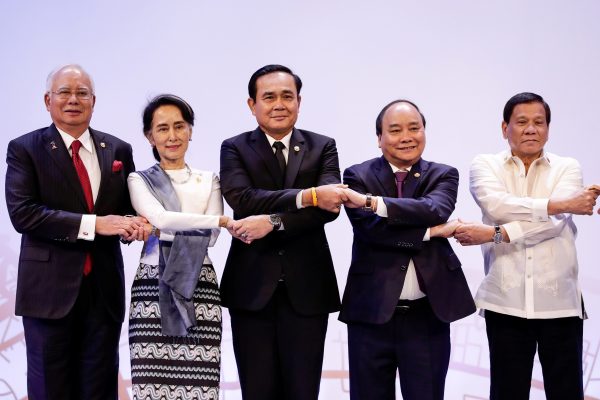in terms of meeting its political-security and socio-cultural targets.
ASEAN’s regional security role has greatly developed in recent years through the international recognition and support of dialogue partners. ASEAN-led regional mechanisms have earned their legitimacy in promoting regional dialogue and building trust and partnerships. But the internal strength of ASEAN remains fragile due to diverse political systems and values, nationalism, extremism and weak governance. ASEAN needs a long-term vision to gradually augment internal strength by being more flexible in implementing the principle of non-interference as well as more open to democratic values and human rights.
In terms of the political-security community, ASEAN’s main issue is its lack of common foreign policy vis-a-vis major powers. It is also extremely difficult for ASEAN to reach any consensus on certain political and security issues. The implementation of rules-based regional institutions — especially the ASEAN Charter — remains limited.
The ASEAN Charter is a set of core principles to guide intra-regional and extra-regional relations. These principles include adherence to the rule of law, good governance, democracy, fundamental freedoms, human rights and social justice. The Charter also emphasises the centrality of ASEAN in external relations while remaining actively engaged, outward-looking, inclusive and non-discriminatory.
The escalating rivalry between China and the United States is causing strategic headaches for many member countries. ASEAN members are not interested in choosing sides, but if they are forced to do so it is unclear what will happen to ASEAN unity and centrality. The governance gap between members is another issue. Some member states have stronger state governance institutions than others, and some have stronger democratic institutions than others.
It is hard to realise a true ASEAN political and security community due to these different political systems and values, levels of governance, democratic institutions and development gaps. ASEAN centrality cannot be sustained if there is no unity or solidarity. Hence, ASEAN must emphasise its strong core values and identity, high levels of political and strategic trust and a deep convergence of interest. This way ASEAN can enhance its internal ties and the member states will become more determined to defend the core values and interests of ASEAN.
ASEAN also needs to enhance regional cooperation and capacity building. Confidence building measures, preventive diplomacy, crisis management and conflict resolution should go hand in hand. ASEAN has a critical role to play in promoting trust and confidence through dialogue and in preventing conflicts from escalating. Third-party arbitration and international laws should be considered if bilateral negotiation fails to build confidence between the conflicting parties and bilateral resolutions cannot be found. The Cambodia–Thailand border dispute resolution is a case in point, in which both countries approached the International Court of Justice for legal arbitration.
Nationalism — mainly caused by domestic political dynamics and nationalistic media — remains high in ASEAN nations. Nationalist and populist political parties have gained more ground in the region and this trend could potentially derail ASEAN’s ambitious regional projects.
Religious fundamentalism and extremism remain a threat to regional peace and stability. Although Southeast Asia is not facing particularly high numbers of terrorism threats compared with other regions, Southeast Asian society is vulnerable to rapid self-radicalisation unless inclusive social and political institutions are in place. Peace-oriented values and education have not been fully implemented, and the ASEAN Institute for Peace and Reconciliation does not function effectively due to the lack of both leadership and financial resources. ASEAN think tanks mainly focus on major power politics rather than conflict management and resolution in the region.
As a result, the development gap is both a socio-economic and security issue. A two-tiered or multi-tiered ASEAN is vulnerable to disintegration and division. The less developed members of ASEAN will choose their own strategic path if they feel that ASEAN does not help them to catch up with other members. The feeling of being left behind will force these less developed members to align themselves with major powers for their survival and interests. To strengthen ASEAN, we need to reduce the development gap and ensure that every member benefits fairly from ASEAN Community building projects.
The ASEAN Charter and ASEAN Community set out ASEAN’s core values and vision as well as action plans for the long-term. But the implementation of these values is slow. ASEAN needs to update its Charter and the blueprints for the ASEAN Community to include a more binding set of enforcement measures and implementation responsibilities. The ASEAN member states need to acknowledge that without building core values, ASEAN will lose its relevance in the medium and long term.
Suos Yara is a Member of the Parliament in Cambodia.

